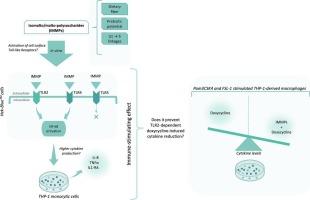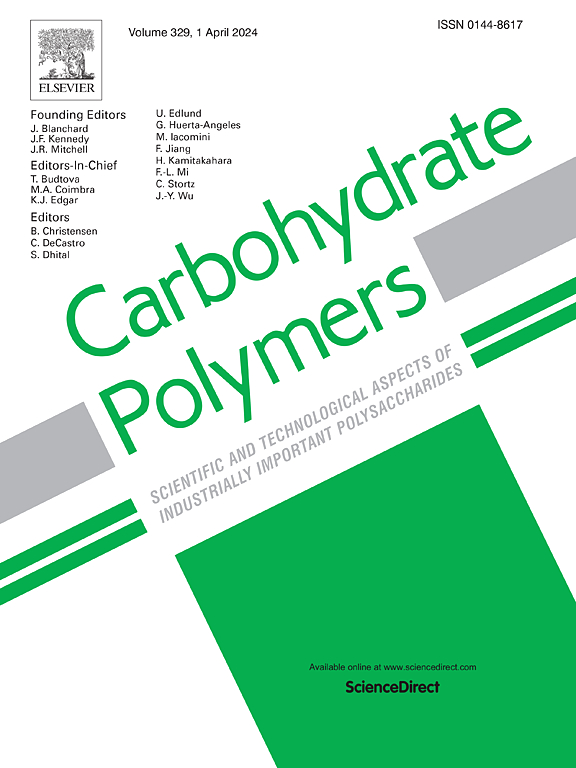异麦芽酮/麦芽多糖通过 TLR2 和 TLR4 在防止强力霉素诱导的细胞因子丢失方面的免疫刺激作用
IF 12.5
1区 化学
Q1 CHEMISTRY, APPLIED
引用次数: 0
摘要
异麦芽糖/麦芽多糖(IMMPs)是一种具有益生潜力的α-葡聚糖,可用作食品配料。然而,它们对细胞产生直接影响的能力仍然未知。IMMPs 可通过激活类收费受体(TLRs)来增强免疫力,类收费受体是抵御病原体的关键。强力霉素是一种需要有效免疫功能的抗生素,但矛盾的是,它通过降低 TLR2 的活性产生免疫抑制作用,从而可能增加对抗生素的需求。我们推测,IMMPs 可被各种细胞表面 TLRs 识别,从而激活 NF-κB 信号通路。此外,IMMPs 的免疫刺激作用可以防止强力霉素引起的免疫细胞中 TLR2 活性的降低。1 毫克/毫升和 2 毫克/毫升的 IMMPs 可激活 TLR2,使 NF-κB 信号分别增加 3.42 倍和 6.37 倍。在 0.5、1 和 2 毫克/毫升浓度下,TLR4 的激活分别增加了 5.47、7.39 和 8.34 倍。IMMPs 可增强 THP-1 单核细胞中 IL-8、TNFα 和 IL1-RA 的产生。此外,用 IMMPs 预孵育巨噬细胞可增强细胞因子的产生,并部分防止强力霉素诱导的细胞因子在 TLR2 激活时减少。分子对接分析支持 IMMPs 和强力霉素与这些 TLRs 结合。这些研究结果表明,IMMPs 可通过 TLR2 和 TLR4 刺激免疫,部分减轻强力霉素的不良影响。这为提高病原体清除率、减少抗生素需求和支持免疫健康提供了一种饮食策略。本文章由计算机程序翻译,如有差异,请以英文原文为准。

Immunostimulatory effects of isomalto/malto-polysaccharides via TLR2 and TLR4 in preventing doxycycline-induced cytokine loss
Isomalto/malto-polysaccharides (IMMPs) are α-glucans with prebiotic potential used as food ingredients. However, their ability to exert direct cellular effects remains unknown. IMMPs may enhance immunity by activating toll-like receptors (TLRs), key for defense against pathogens. Doxycycline is an antibiotic that requires an effective immune function but paradoxically has immune-attenuating effects by reducing TLR2 activity, potentially increasing antibiotic needs. We hypothesize that IMMPs are recognized by various cell surface TLRs, leading to the activation of the NF-κB signaling pathway. Furthermore, IMMPs' immune-stimulating effect could prevent the doxycycline-induced reduction of TLR2 activity in immune cells. IMMPs activated TLR2, increasing NF-κB signaling by 3.42- and 6.37-fold at 1 and 2 mg/mL, respectively. TLR4 activation increased 5.47-, 7.39-, and 8.34-fold at 0.5, 1, and 2 mg/mL. IMMPs enhanced IL-8, TNFα, and IL1-RA production in THP-1 monocytes. Additionally, preincubation of macrophages with IMMPs enhanced cytokine production and partially prevented doxycycline-induced cytokine reduction in response to TLR2 activation. Molecular docking analyses support IMMPs and doxycycline binding to these TLRs. These findings suggest that IMMPs stimulate immunity via TLR2 and TLR4, partially mitigating doxycycline's adverse effects. This provides a dietary strategy to enhance pathogen clearance, reduce antibiotic needs, and support immune health.
求助全文
通过发布文献求助,成功后即可免费获取论文全文。
去求助
来源期刊

Carbohydrate Polymers
化学-高分子科学
CiteScore
22.40
自引率
8.00%
发文量
1286
审稿时长
47 days
期刊介绍:
Carbohydrate Polymers stands as a prominent journal in the glycoscience field, dedicated to exploring and harnessing the potential of polysaccharides with applications spanning bioenergy, bioplastics, biomaterials, biorefining, chemistry, drug delivery, food, health, nanotechnology, packaging, paper, pharmaceuticals, medicine, oil recovery, textiles, tissue engineering, wood, and various aspects of glycoscience.
The journal emphasizes the central role of well-characterized carbohydrate polymers, highlighting their significance as the primary focus rather than a peripheral topic. Each paper must prominently feature at least one named carbohydrate polymer, evident in both citation and title, with a commitment to innovative research that advances scientific knowledge.
 求助内容:
求助内容: 应助结果提醒方式:
应助结果提醒方式:


